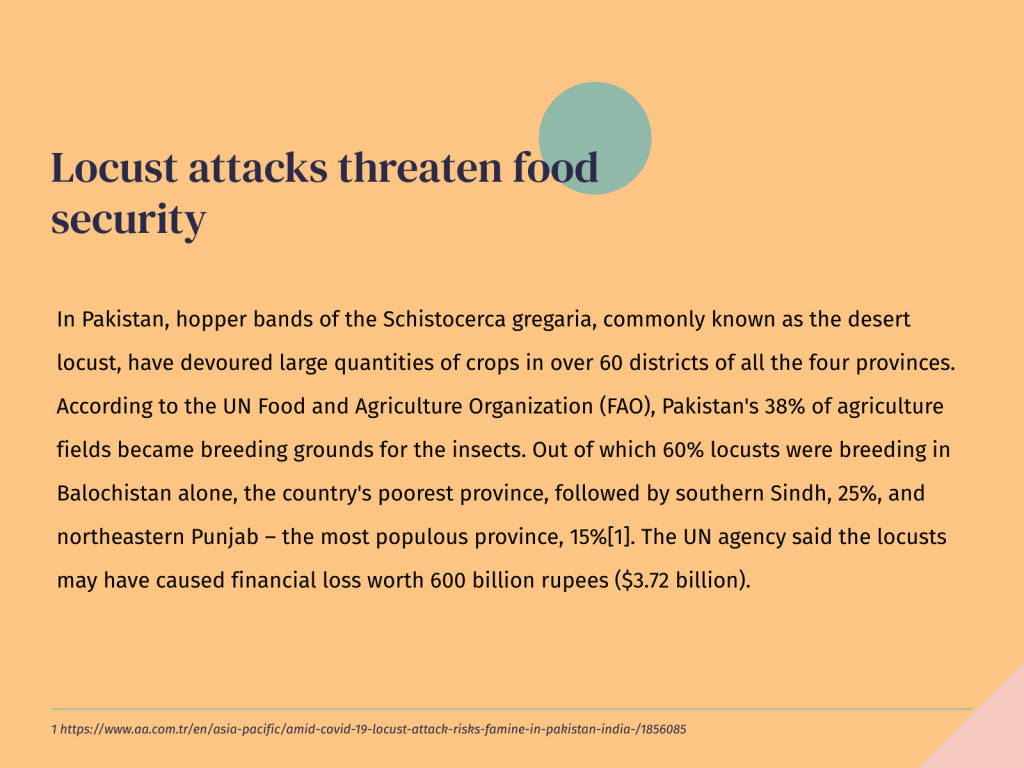
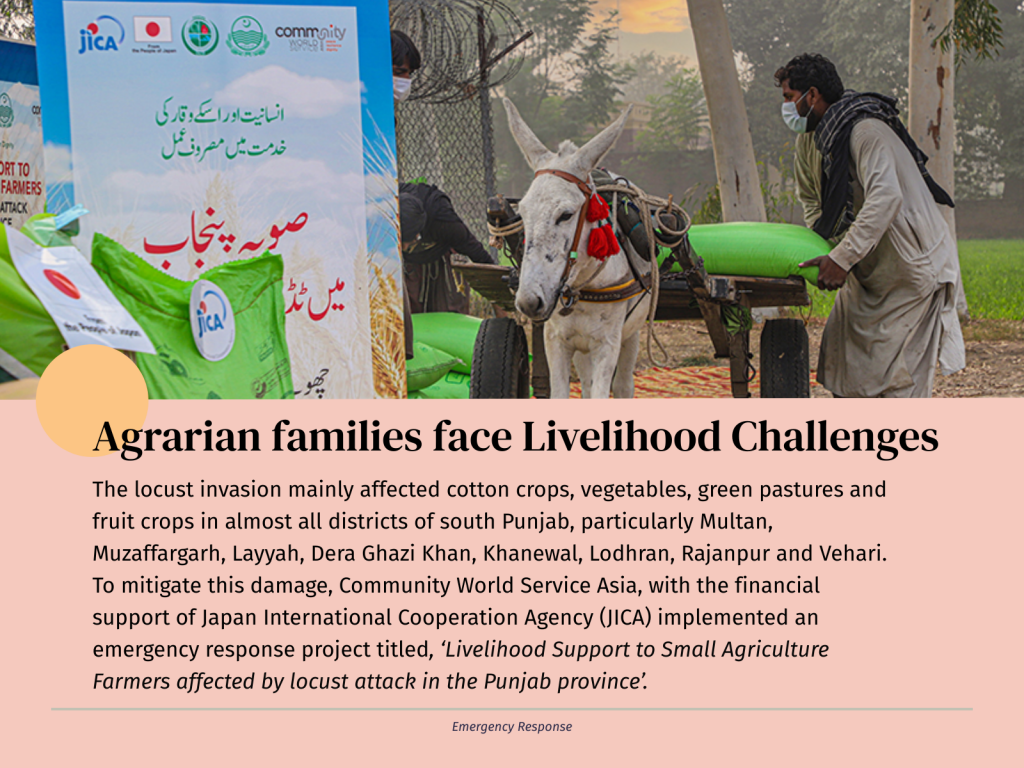
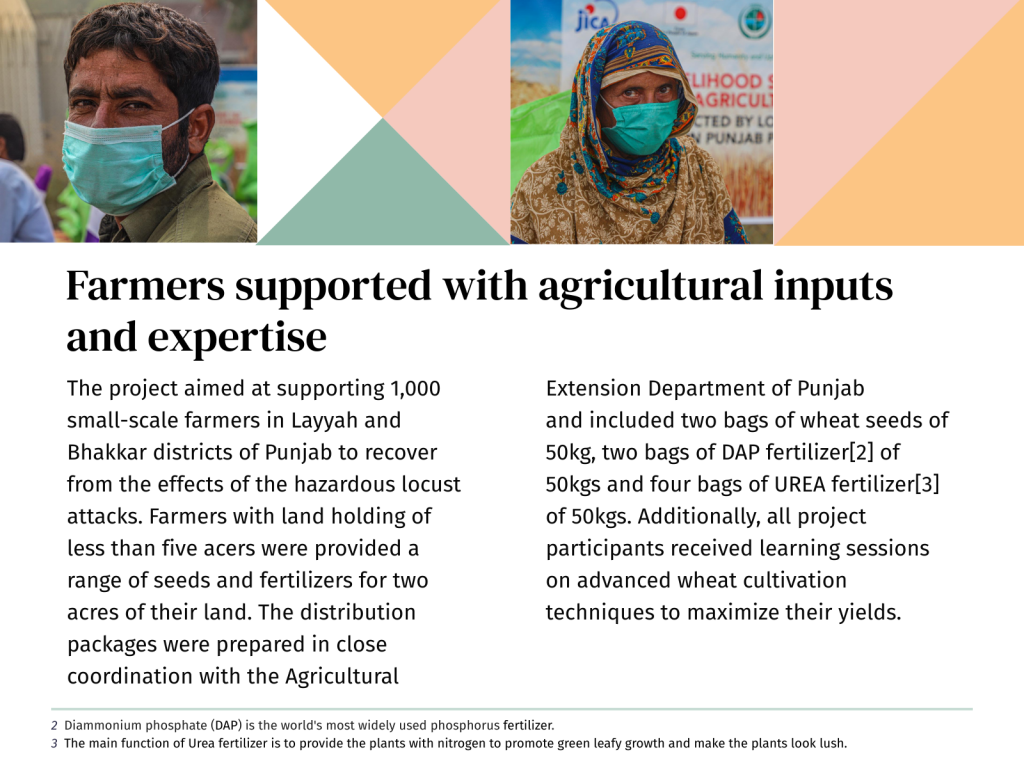
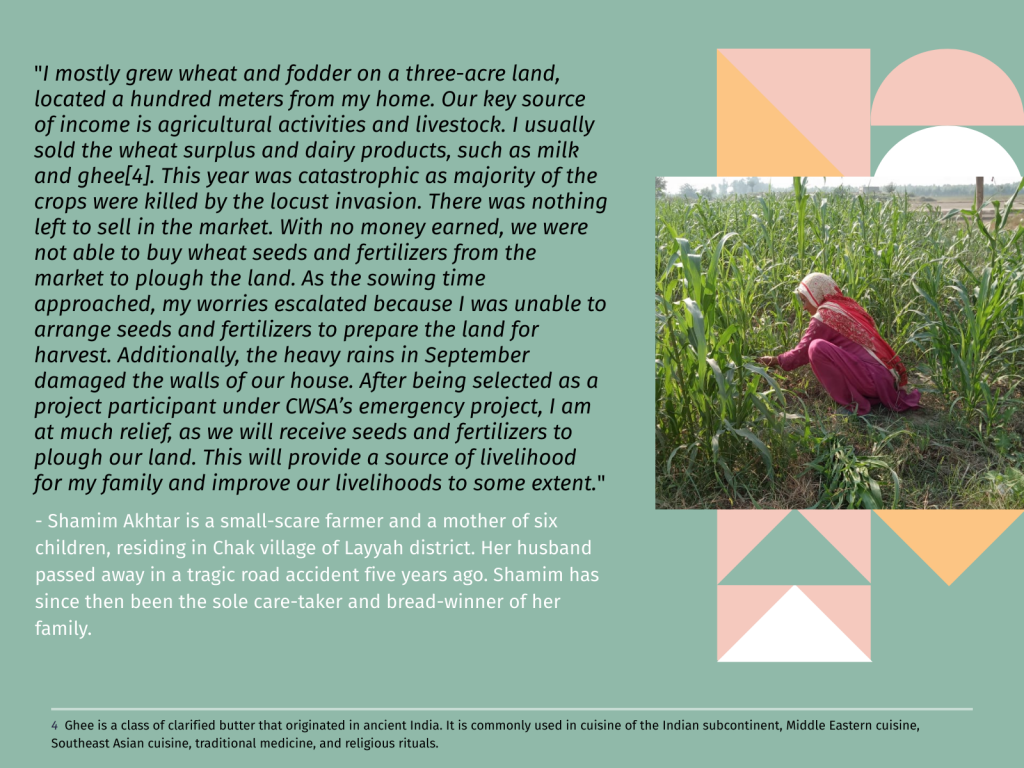
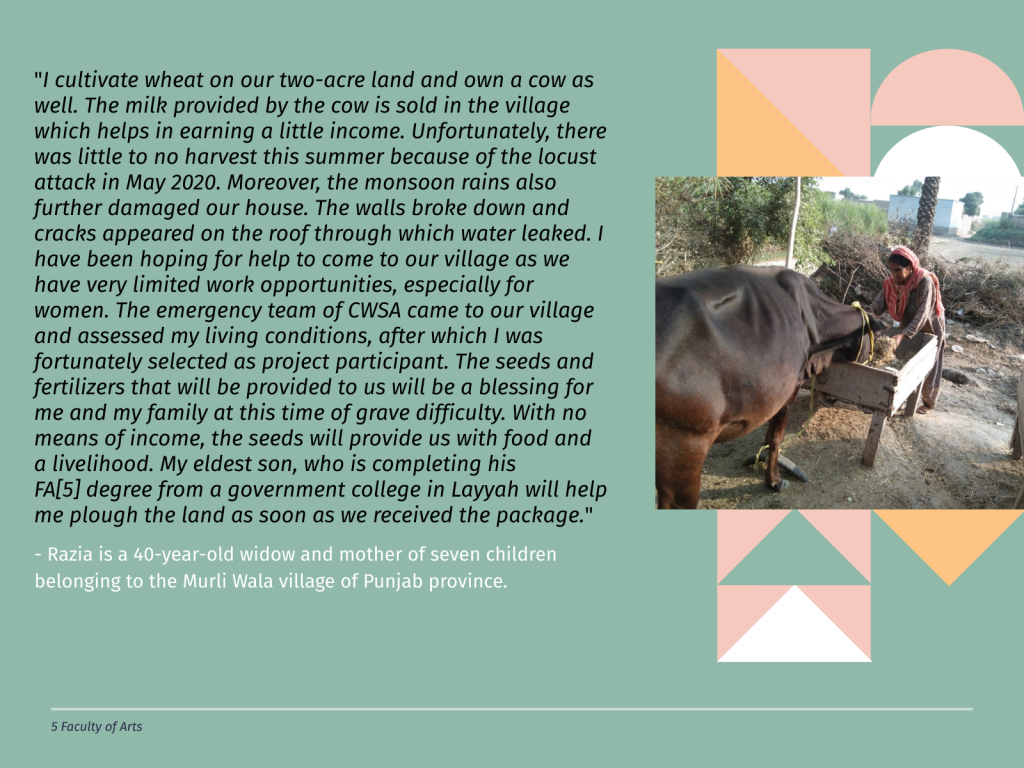
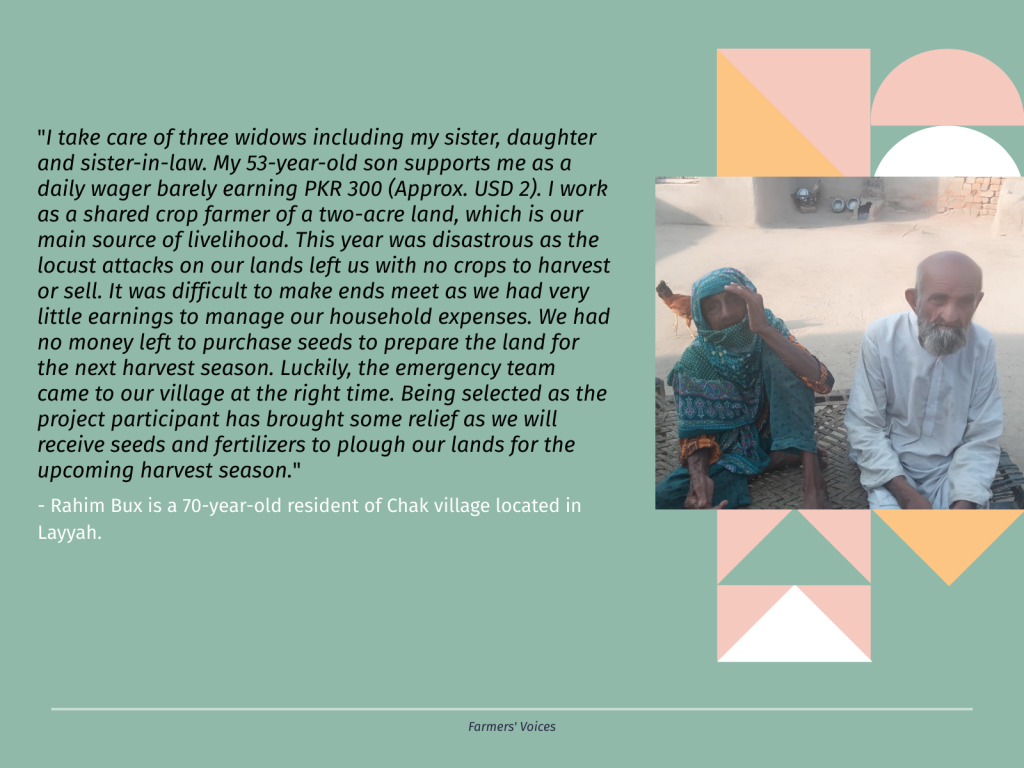
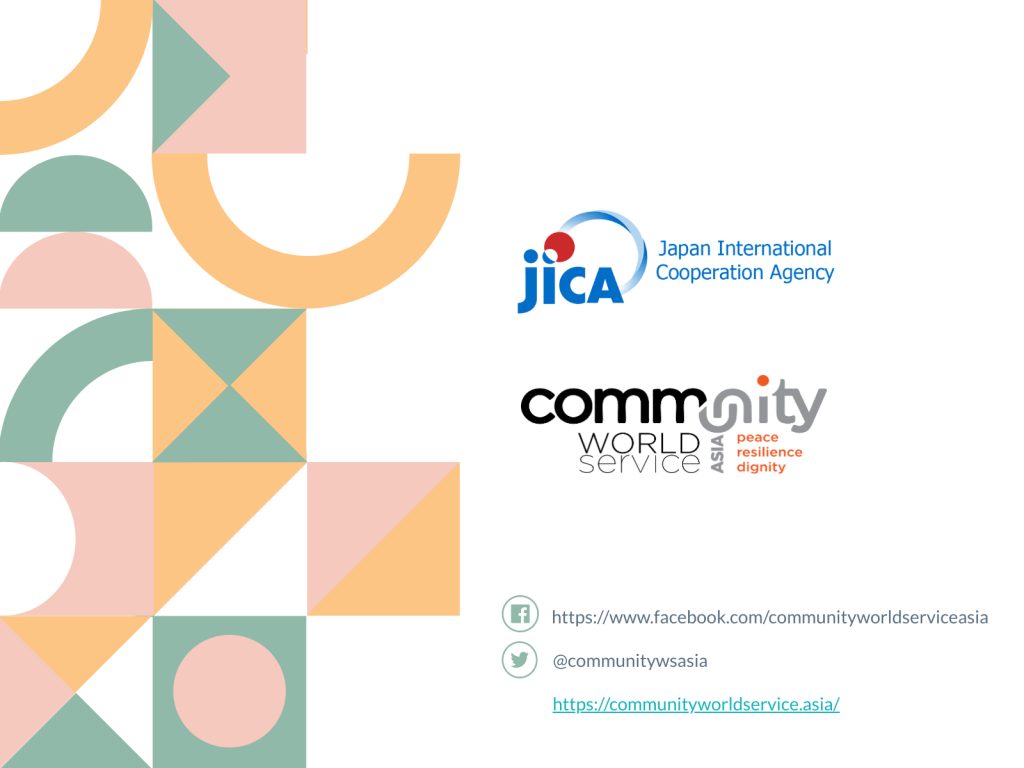







Iqbal Mai, is a widow and a single mother of three children who lives in and belongs to Bait village of Punjab province. Bait village is home to almost a hundred families who primarily depend on farming activities for a livelihood. Iqbal Mai’s children, aged between 18 and 12 years, help her with sowing, harvesting, fertilisation and irrigation activities in the agricultural fields.
Mai’s husband was also a farmer who tragically passed away after suffering a cardiac arrest in 2014.
“After the demise of my husband, I had to take all the responsibility of caring for my children and home. The tragedy that was my husband’s death however did not lessen my hopes and determination of giving a better future to my children. I started to work on the fields; ploughing the lands, sowing the seeds, irrigating the lands and harvesting the crops. I strongly believe that literacy is critical to having a chance of a better future. I see it as something that will guide my children towards a brighter future and an improved standard of living,” shared Iqbal Mai.
Fifty-seven-year-old Mai manages to send her all children to a nearby local school through the income she has been earning from agricultural farming.
Through cultivation of wheat and cotton on a two-and-a-half-acre self-owned land, Mai earns an annual income of PKR 50,000 (Approx. USD 310). Cotton is assumed as one of the main cash crops in Punjab province which is the most Agri-enriched region of the country and contributes to 22% of the country’s total agri-business. The seasonal crops cultivated in Bait are irrigated with available canal channels and the river Chenab, which is a major source of water in the region.
To prepare the land for harvest season, Iqbal Mai took a loan of PKR 30,000 (Approx. USD 186) from a well-know landlord in their village. She took the loan to prepare the land to grow wheat.
“Last year, the wheat growing on the lands was severely damaged due to wheat leaf rustⁱ. I had no other option but to take a loan to prepare the land for the next harvest season. I rented a tractor for PKR 10,000 and also paid a tube well owner PKR 10,000 to provide water. The remaining amount was consumed on labor costs for ploughing the land. Sadly, all the harvest was lost.” The recent locust invasion on the agricultural lands in South Punjab destroyed acres of agricultural land including Iqbal Mai’s little livelihood source. “We tried all the indigenous techniques to get rid of the locusts such as waving rackets on the fields and using smoke to clear out the locusts, but nothing helped. All our hard work on the field was wasted in front of our eyes. We were unable to save our harvest and had no crops to sell.”
Community World Service Asia’s Emergency response team visited Bait village for an initial assessment to select the most vulnerable and underprivileged small-scale farmers affected by the locust attacks in the area for a short-term humanitarian project[1]. Iqbal Mai was selected as a project participant. Through the project she received two bags of 50 kgs of wheat seeds each, two bags of DAP fertilizer of 50kgs each and four bags of UREA fertilizer of 50kgs each. She plough the land with wheat seeds and is actively using the fertilizers to enhance the natural fertility of the soil. Mai was also part of awareness raising, orientation and capacity enhancement sessions on learning skills and expertise about wheat cultivation techniques required to maximize yields in April and May 2020. Mai’s hopes are very high this year as she is positive to have rich and healthy crops at the end of harvest season in May 2021.
ⁱ Leaf rust, also known as brown rust, is caused by the fungus Puccinia triticina. This rust disease occurs wherever wheat, barley and other cereal crops are grown.
ⁱⁱ Livelihood Support to Small Agriculture Farmers affected by locust attack in the Punjab province project, implemented by Community World Service Asia and funded by Japan International Cooperation Agency (JICA).
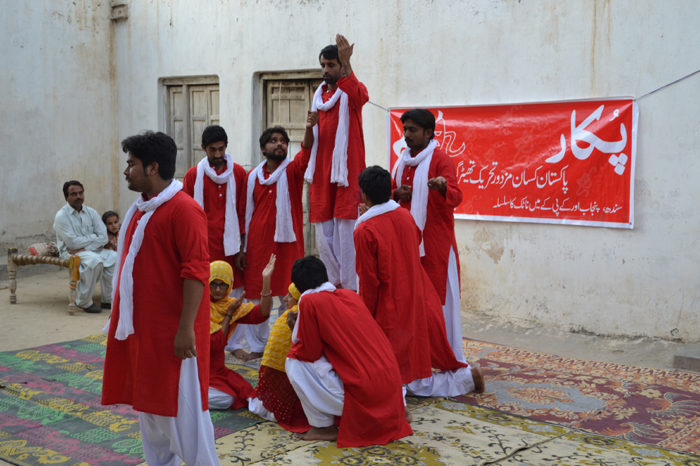
Imam Uddin Soomro is an active member of the Pakistan Kissan Mazdoor Tehreek (PKMT), an alliance of small-scale and landless farmers including women farmers. Imam collects data on crops and conducts awareness sessions for farmers on sustainable agriculture, green revolution and globalization. As a member of a local theatre group named, PUKAR, since 2018, Imam also performs as an interactive theatre artiste in rural villages, organises learning events and writes articles on agriculture and farmers’ rights in local languages.
The PKMT was formed in 2008 as a result of a series of discussions among powerless farmers and social and political activists who felt that an organised platform to voice their demands was essential for small-scale farmers facing social and economic constraints.
“We perform plays that enable us to interact with different communities. The theatre plays address issues that are part of the PKMT struggle, including feudalism and the impact of corporate agriculture. As a theater performer, I was selected as a participant in a training tilted, Interactive Theater for Influencing, in July 2019. The training provided technical knowledge and capacity building opportunities on skills required to influence communities to bring about progress in the society. Our skills of script-writing, communications and character-building were further enhanced in the seven-day residential training.” said Imam.
All seven members of the PUKAR theater group participated in the training which gave them networking and experience- sharing opportunities with other like-minded participants. The session on ‘team building’ and ‘inhibition breaking’ helped participants self-assess themselves and understand their pivotal and influential position in society. Participants learnt about stage directions, allowing the audience to grasp every performers’ act and the message they are conveying through their role plays.
“We met with other theater groups from Peshawar, Sindh and Islamabad. All the groups had different interactive skills to perform as we all engage with different kinds of audiences. The members of other groups shared the issues they highlighted through their plays and how they passed on the resolutions,” shared Imam.
On the last day of the training, participants developed action plans to further implement the learning and skills learnt during the training.
“Initially, we would randomly select issues and base our plays on those issues. After the training, we altered our strategy. We now plan a meeting to identify the common issues that are prevalent in the communities through meetings with community members and develop a script for the play accordingly to work together to rectify the challenges people are facing. CWSA has extended support in reviewing the scripts which we plan to avail,” expressed Imam.
A group exercise that engaged the training participants in planning a theater play with other members of the group allowed collaborative learning and practical experience-sharing through coordination among the members. Imam narrated,
“When we acted with other theater performers, we learnt to show strong facial expressions as that also largely impacts the deliverance of the message and not just the dialogues. This joint exercise helped in modifying our acting and delivery gestures in order to have an even stronger impact in the communities we perform.”
Prepared by the Communications Office
August 26, 2020
This year’s fifth monsoon spell in Pakistan started on Monday August 24th and continued throughout Tuesday, swamping districts of Mirpurkhas, Umerkot, Tharparkar, Mithiari, Sanghar, Nowshero Feroze, Jamshoro, Tando Muhammad Khan, Tando Allahyar, Karachi, Thatta, Sujawal, Badin, Dadu, Hyderabad, Chor and Tando Jam in the Sindh province. Monsoon rains and subsequent flooding have left 90 people dead, 40 injured and large-scale infrastructural damage across Pakistan so far this year. Almost 900 houses have been fully damaged, while 195 have been partially damaged in the affected areas.
Pakistan’s National Disaster Management Authority (NDMA) has confirmed 31 deaths in Sindh, 23 in Khyber Pakhtunkhwa, 15 in Baluchistan, 10 in Gilgit Baltistan, 8 in Punjab and 3 in Pakistan Administered Kashmir during this monsoon season in Pakistan.
Many houses and public buildings, such as public hospitals, offices and schools, in rain-hit districts are flooded with rainwater and are currently inaccessible. The agrarian community has suffered even more massive damages to their land and harvests. Huge amounts of livestock in rural regions have also perished with the flash floods. Moreover, many rural communities in Badin and Tharparkar districts of Sindh have been displaced and have personally relocated to safer and more low-risk areas.
According to Pakistan Metrological Department, continued heavy rains and thunderstorms in lower Sindh are expected the week ahead which may further aggravate the situation. The Government of Sindh has therefore declared Emergency throughout the Sindh province.
Community World Service Asia’s (CWSA) Response
CWSA’s Emergency response team is currently providing emergency cash assistance to flood affected families in district Dadu and are engaged in relief operations responding to the needs of COVID-19 affected communities in district Umerkot and Karachi city of Sindh. The team is also regularly monitoring the rain and floods situation and plans to extend their humanitarian response to provide support to flood-affected communities in other areas when required.
Contacts:
Shama Mall
Deputy Regional Director
Programs & Organizational Development
Email: hi2shama@cyber.net.pk
Tele: 92-21-34390541-4
Palwashay Arbab
Head of Communications
Email: palwashay.arbab@communityworldservice.asia
Tele: +92 42 3586 5338
Source:
Reehana, Easy Approach Community Organization (EACO), PakistanWe were taught to carefully choose our mode of communication to effectively influence communities in a positive way and bring real change.
Reehana participated in a training titled “Essentials of Social Mobilization” held in Lahore under Community World Service Asia’s Capacity Enhancement Program for local humanitarian and development practitioners in Pakistan. The training took place in August 2019 and was participated by twenty-eight staff members representing eleven civil society organizations from across Pakistan. Participants strengthened their knowledge and skills on concepts of mobilization and influencing, conflict resolution and policy development in the four-day workshop.
Employed with Easy Approach Community Organization (EACO) as a Program Manager for ten years, Reehana is actively engaged in community mobilization and management of Community-Based Organizations[1] (CBOs). She is responsible to ensure smooth implementation of projects through providing guidance and support to field staff and monitoring and reporting on the project. With over 15 years of experience in the development sector, Reehana has worked with various local and national level organizations in different capacities and found this training to be one of the most enriching personal development experiences in her career.
shared.When I saw the contents of the ‘Essentials of Social Mobilization’ training I could not wait to attend it. The content was related to the work we are doing in EACO, therefore, I believed that the learning would be fruitful in terms of strengthening influence and bringing change in the communities we are working in,
I have taken part in numerous trainings focused on Microfinance, Leadership Skills, Human Resource Management and Social Mobilization. But I was lucky to get a chance of attending this training workshop as the holistic approach incorporated by the CEP[2] team has been very interactive and high-yielding for me.
The two facilitators leading the training, Moazzam Ali and Nergis Ameer Khan, engaged us in developing content of the training resulting in the content being relevant to our work and nature of field activities. We also gave input in designing the pre and post training assessments to make the learning more effective and useful. The most interesting aspect of the training was identifying a need for a social mobilization policy and actually starting drafting one during the training. EACO did not have a separate policy on social mobilization. Currently, EACO is working on the first draft of the policy and aims to take support of Community World Service Asia for review and recommendations for improvements.
expressed Reehana.After enhancing my own skills and building my own knowledge at the training, I organized a training for the fifteen field staff members of EACO. The learnings of my training with CWSA, were shared with all the participants and the team assured to implement the new techniques of mobilization in their field of work. The training provided insights on conflict resolution. Consequently, the field team arranged a community level meeting to resolve the conflict between two communities in Mohala Sadiqi Haidri Farooqabad in Sheikhupura district. There was no draining system for waste water. People in the communities were facing health issues due to the standing dirty water in the area. The conflict arose as the communities blamed each other for not constructing a proper drainage system. In the meeting, community members were mobilized to gather measurements for the pipelines to install the drainage system. The costs of installing the system were divided among the two communities and two members from each community were selected to collect the funds. The communities mutually agreed to invest jointly to build a better drainage system for both the parties to benefit from. The project of draining system was completed under EACO technical and partial financial support,
concluded Reehana emphatically.The training allowed a systematic learning of social mobilization which consequently improved our quality of work. The communities we work in trust us more and are comfortable with our interventions. I will be happy to recommend such trainings to my colleagues and CBOs[3]as they are relevant to our work and are very useful in the humanitarian sector. These learning opportunities provide a platform to network and increase our capacities at the same time,
[1] Community based organizations (CBO’s) are nonprofit groups that work at a local level to improve life for residents.
[2] Capacity Enhancement Program
[3] Community Based Organizations
Local level organizations engage the most crucial, unreachable areas of a community, empowering it from within. They enable community members to enhance their own and others’ capacity to create waves of social change. One way Community World Service Asia supports local organizations in their grassroots efforts is to equip them with effective strategies of social mobilization. These strategies assist communities in contributing to and participating more productively in social, economic, politico-legal and decision-making fora to improve the lives of the most vulnerable.
Bringing Social Mobilization to Communities Through Training
Community World Service Asia’s Essentials of Social Mobilization training workshop aims at enhancing social mobilizers’ skills to overcome existing barriers in communication, performance and engagement with their target communities.
CWSA conducted this training at the Department of Social Work at University of the Punjab from August 28 to 31, 2019. The training engaged 28 social mobilizers and staff members from 11 local organizations in various theoretical and practical learning experiences to enhance their social mobilization capabilities. Participating organizations included Médecins du Monde, Helping Hand for Relief, The Brooke Hospital for Animals Pakistan, Easy Approach Community Organization (EACO) and Forum for Language Initiatives.
The training helped the participants to develop an understanding of:
The training employed a mix of activities, energizers, group discussions, indoor and outdoor role plays, innovative use of audio/visual techniques and daily reinforcement to support learning. It also provided an opportunity for the participants to share their experiences and success stories with their peers, which helped them to develop a sense of trust and confidence, strengthening the group work dynamics.
By the end of the four days, with the support of the CWSA team and resource persons, Moazzam Ali and Nergis Khan, the participants prepared customized action plans to apply their learning within their organizations and in the communities they serve. Equipped with practical knowledge and actionable plans, the participants expressed their eagerness for additional training on other topics to continue to increase their effectiveness in their work.
Participants’ Voices:
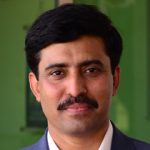 “The training techniques were interesting and engaging. The trainers, Moazzam Ali and Nergis Khan, not only held theoretical session, they also engaged participants in practical learning exercises such as role plays and group activities. We can replicate these activities in the target communities to build capacities of community members.” Mahmood Ahmad Medecins du Monde
“The training techniques were interesting and engaging. The trainers, Moazzam Ali and Nergis Khan, not only held theoretical session, they also engaged participants in practical learning exercises such as role plays and group activities. We can replicate these activities in the target communities to build capacities of community members.” Mahmood Ahmad Medecins du Monde
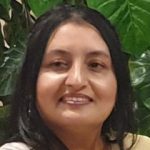 “The activities conducted in the training workshop were interactive and provided long-term learning. The session on Policy of Social Mobilization made me realize the importance of having such a policy on an organizational level. These policies can be designed in accordance with the culture and context of the organization, which will boost the efficacy of the project activities for the welfare of communities.”
“The activities conducted in the training workshop were interactive and provided long-term learning. The session on Policy of Social Mobilization made me realize the importance of having such a policy on an organizational level. These policies can be designed in accordance with the culture and context of the organization, which will boost the efficacy of the project activities for the welfare of communities.”
Rehana Yasmeen Easy Approach Community Organization (EACO)
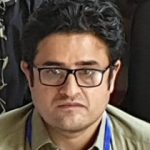 “The training content helped me in overcoming the communication and mobilization gaps which exist in my field work. Moreover, the training environment was very welcoming, and it allowed me to share experiences openly and learn from others’ as well.”
“The training content helped me in overcoming the communication and mobilization gaps which exist in my field work. Moreover, the training environment was very welcoming, and it allowed me to share experiences openly and learn from others’ as well.”
Sajjad Ahmad Forum for Language Initiatives
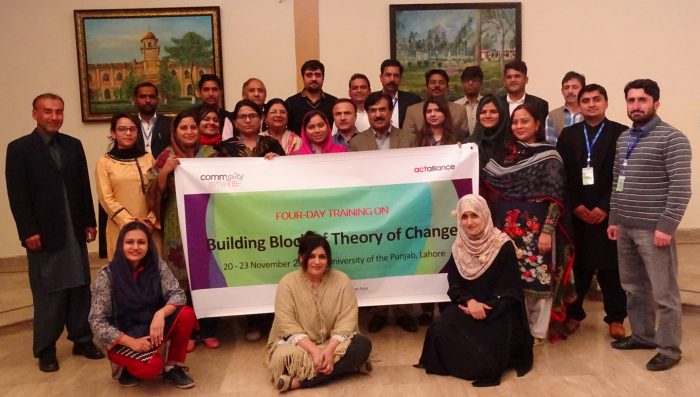
Theory of Change (ToC) is a powerful tool that helps organizations and initiatives plan how they will achieve change, assess their effectiveness and communicate to stakeholders. Growing in popularity over the last decade, the international development community (practitioners and donors alike) shows great interest in using ToC for organizational planning, implementation and monitoring purpose. The national level organizations also showed interest in learning and applying ToC at their organization level. ToC help facilitate better planning to ensure that activities are linked to a detailed understanding of how change actually happens.
To help CSOs in Pakistan to learn the approach of and the method to apply ToC in their organizations, Community World Service Asia organized a 4-day training at Punjab University, Lahore from November 20 – 23, 2018. Zaigham Khan, a renowned development professional, facilitated the 4-day workshop. Twenty-five participants from 10 organization attended the workshop.
The training enabled participating organizations in identifying steps for long-term impact and strategic planning and facilitated for sequencing of theory of change approach. The participants reviewed their organizational strategy using theory of change approach and learnt the use of ToC to enhance accountability and learning. In addition, they acquired the skill of integrating ToC into their organization’s planning, monitoring and evaluation processes if future.
Voices of the Participants:
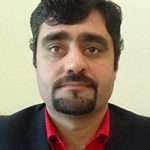 “Being a technical training, Zaigham made this training very rewarding and enjoyable. I learned a lot from this training and will try my best to improve further and train other staff in my organization on this. I want to express my gratitude for our facilitator for his outstanding way of articulation, knowledge and providing such a friendly learning environment.”
“Being a technical training, Zaigham made this training very rewarding and enjoyable. I learned a lot from this training and will try my best to improve further and train other staff in my organization on this. I want to express my gratitude for our facilitator for his outstanding way of articulation, knowledge and providing such a friendly learning environment.”
Muhammad Ayoub from Aga Khan Agency for Habitat
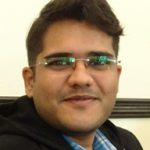 “We acquired the skills of integrating ToC into our organization’s planning, monitoring and evaluation processes. Zaigham has been an outstanding resource person throughout the workshop and will prove to be more useful in future because of his availability and willingness to provide technical assistance after the workshop.”
“We acquired the skills of integrating ToC into our organization’s planning, monitoring and evaluation processes. Zaigham has been an outstanding resource person throughout the workshop and will prove to be more useful in future because of his availability and willingness to provide technical assistance after the workshop.”
Basil Dogra, Center for Law & Justice
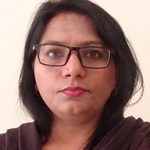 “Interactive discussion and practical group activities made learning more interesting and productive. The difference between the ToC and Log Frame was made clear in this training. I am grateful to Community World Service Asia to provide such an opportunity which will be beneficial for our organization in the long-run.”
“Interactive discussion and practical group activities made learning more interesting and productive. The difference between the ToC and Log Frame was made clear in this training. I am grateful to Community World Service Asia to provide such an opportunity which will be beneficial for our organization in the long-run.”
Kiran Yochbed from Taangh Wasaib Organization
 “I am grateful to be given this opportunity to learn Theory of Change. I learned the current practices of ToC and how to design community development projects. I am now able to connect ToC to the log frame for Monitoring & Evaluation. This training has enabled me to see the project activities from a different and broader level.”
“I am grateful to be given this opportunity to learn Theory of Change. I learned the current practices of ToC and how to design community development projects. I am now able to connect ToC to the log frame for Monitoring & Evaluation. This training has enabled me to see the project activities from a different and broader level.”
Nadeem Matto from Pak Mission Society
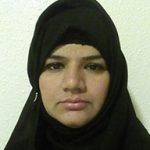 “This 4-day training was very interesting and beneficial for my organization as a whole. The training was conducted with a participatory approach including practice, sharing, discussions and group work. Our facilitator was well-versed and attended all our queries effectively. I hope to implement the learning in my work to bring positive results for community development.”
“This 4-day training was very interesting and beneficial for my organization as a whole. The training was conducted with a participatory approach including practice, sharing, discussions and group work. Our facilitator was well-versed and attended all our queries effectively. I hope to implement the learning in my work to bring positive results for community development.”
Bushra Malik Forum for Language Initiatives
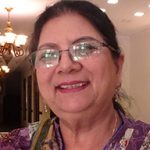 “I am working in the NGO sector for the past twenty years. This workshop has proved to be very useful in my field of work. The knowledge of ToC tools has enabled me to develop effective projects. Zaigham Khan has been very patient and helpful throughout the training.”
“I am working in the NGO sector for the past twenty years. This workshop has proved to be very useful in my field of work. The knowledge of ToC tools has enabled me to develop effective projects. Zaigham Khan has been very patient and helpful throughout the training.”
Josna Azeem from Christian Women’s Development Association
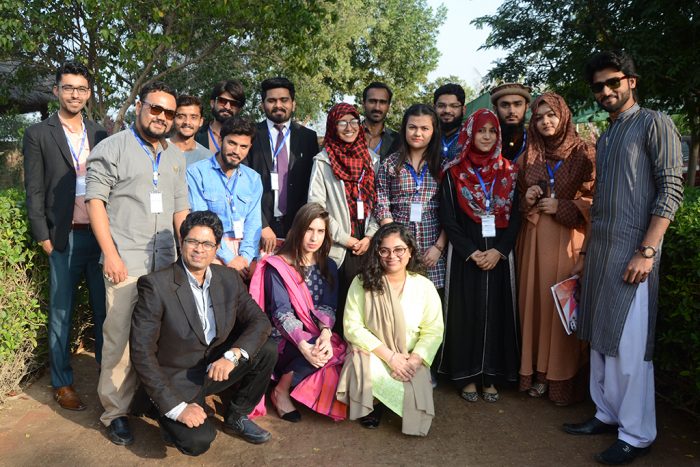
A series of trainings on Social Media Management for alumni students of the Youth United for Change network from different universities across Pakistan were held in the cities of Hyderabad, Mirpurkhas, Lahore and Faisalabad. The trainings aimed at enhancing the knowledge of students and graduates on social media, its key tools, its impact and usability for bringing positive changes and awareness.
Popular social media campaigns and their impact were shared with participants. Through assignments and interactive exercises alumni students were guided on how to plan and develop their own successful social media campaigns on social causes, awareness issues and development goals. Inspiring and innovative video and photo campaigns successfully run on social media platforms by UN agencies, international aid organizations, CSOs and global academic networks were shown to participants to get inspiration from. Group activities on developing informative viral campaigns, #Hashtag activism, infographic development and creating facebook pages encouraged students to bring out their creativity and put on their thinking hats. At the same time, these youth representatives were cautioned on the cons of mis-using social media and the ethical considerations to take while developing and implementing campaigns on social networks. A significant session of the training emphasized on using social media tools to share knowledge on the Sustainable Development Goals (SDGs) and to develop campaigns that would help us achieve the global goals unitedly as a nation.
Students’ Corner:
“Youth must be united for progress and development of their country and in today’s age social media is the most effective and engaging platform which is easily used and available to everyone. Together we can bring positive change through innovative social media and #hashtag campaigns,” Mohammad Shebaz, alumni of University of Sindh, Mirpurkhas Campus.
“The training was very fruitful. The facilitator of the training delivered all sessions effectively and efficiently for us to build a clear understanding of social media and how to use it. We learnt to use social media ethically as well which most of us overlook and do not take concern of. These kind of trainings fulfill the need of today’s society where social media is frequently used by most individuals, especially youth,” Ajay K. Rathore, alumni of University of Sindh, Mirpurkhas Campus.
“This experience was very informative, creative and productive. We learnt new ways of interacting in different social media sites and how to make our content effective and eye-catching.” Maham Ansar, alumni of University of Sindh, Jamshoro.
“The way of delivering sessions step by step was helpful to understand the different terms and sites of social media. In a short period of one day, we managed to gain interesting facts regarding the techniques of using social media which we were initially unaware of.” Hoorab Ansar, alumni of University of Sindh, Jamshoro.
“Being an Alumni Member, this training was very helpful as social media has become one of the main modes of media to get connected globally. The frequent use of social media is productive and impactful, for youth especially. The training helped in understanding blogs and article writing and how to start campaigns within ethical boundaries. Furthermore, it helped to understand getting over the distance gap and stay connected and united with youth from the South-Asian region through social media platforms. It also enabled me to develop effective and productive messaging for positive social changes in the region.” Mahnoor, alumni of University of Sindh, Mirpurkhas Campus.
The aim of all professionally trained project managers is to deliver high quality deliverables at every stage of the project, with effectively utilizing their team and without compromising costs and deadlines. Professionals must be trained to be effective leaders and managers by developing key qualities and applying smart strategies that uphold the integrity of the organization. Recognizing this requisite, Shewaram Suthar felt that his organization and department needed to enhance their capacities on specific skills to ensure that their organizational goals and objectives are met timely, effectively and efficiently.
Shewaram is working as Manager Programs with the Association for Water, Applied Education & Renewable Energy (AWARE) and firmly believes that training and skills development provides both, the organization and the individual employee, with expertise and benefits making it a worthwhile investment.
I have been with Aware since 2014. We have four offices operating in Sindh. Our head office is in Umerkot with district offices in Badin, Tando Mohammad Khan and Tharparker.
Though I completed my masters in Zoology, I was always attracted towards the social sector. The work done for the development of the country and building better lives for the people of the country inspired me to join the development sector. I wanted to play my part in making the world or Pakistan a better place to live. We are not a very big country but playing our part to make living easier for even a few is an essential motive to achieve.
Shewaram is heading a group of teams implementing eight projects in four districts of Sindh.
Many challenges are faced internally and externally. One of the main problems in the organization was the lack of technical knowledge in reporting, project planning, financing and monitoring. With time changing so rapidly, new methodologies and tools are being introduced to improve the functions of various departments. However due to lack of resources, it is difficult to stay updated. This affects the quality of work we do on a daily basis. In addition, we particularly lacked in proposal writing skills. My team and myself, failed to develop winning and all inclusive project proposals.
Through November 2016 to March 2017, Shewaram attended trainings on Project Design and Project Planning conducted by Community World Service Asia. The trainings aimed to provide a systematic approach to managing and maintaining different types of projects, organizational changes and development. Shewaram also nominated his team members to participate in other topic and subject specific trainings conducted by Community World Service to enhance the organization’s overall staff capacity.
quoted Shewaram. Prior to the participating in the trainings, the departments of Human Resource Management, Finance, Monitoring and Evaluation (M&E) and Programs lacked in quality management and technical knowledge shared Shewaram.Given a platform by Community World Service Asia, I thought of utilizing its benefits to the fullest. I sent relevant staff members to the trainings which were conducted under the Capacity Institutionalization Program. This capacity building opportunity offered to us provided all the necessary guidelines for seasoned and skilled professionals to effectively master project management,
Shewaram further added that the M&E methodologies incorporated in the M&E LFA has helped to derive quality outcomes from the projects. The Complain Mechanism (CM) Policy was revised, providing a contact number to all staff members and assigning the number to the focal person appointed to handle complains according to the CM Policy.Coming back from the project planning training, I initiated work on revising all policies and manuals. All the documents for our Human Resource, Finance and M&E departments were updated. The Gender Policy, Child Protection Policy, Communications Strategy, Accountability Framework and other existing documentations were renewed. Each department assigned a focal person who was looking into implementation and enforcement procedures of the revised documents. That focal point would be contacted in relation to any query addressed by internal staff or external stakeholders, donors or partners. The Logical Framework Analysis (LFA) of M&E was formed after two of our staff participated in the M&E Training conducted in March 2016 in Islamabad.
Every focal person has a Terms of References (TOR) document according to which they deliver their duties. They are trained to research for new tools or methodologies for timely revision of all policies and manuals existing in all departments.
Shewaram also recognized that it is essential to have consistent collaboration among projects with multidisciplinary teams.
We established the Resource Mobilization Unit (RMU) lead by the CEO of Aware. The unit consists of seven members including the CEO, Manager Programs, three Project Managers, one M&E staff and a Finance Manager. The main function of the unit is to secure new and additional resources for the organization. It also involves making better use of, and maximizing, existing resources. This unit has filled the gap which existed between the employers and the management team. The RMU has become a useful tool through which we communicate effectively and share necessary updates about the status of the project and departments. The progress and challenges faced internally and externally on field by all departments are discussed and inputs are shared in the meetings we conduct on a monthly basis.
Shewaram and his RMU have developed five project proposals since the proposal writing training out of which two have been accepted.The training I attended on project proposal writing was very beneficial. I use to write basic proposals due to lack of knowledge in technicalities. The training helped built a better understanding in format writing, word limit, line spacing and various components attached to make a good proposal. We often overlooked these minor details which resulted in improving the quality of our proposals immensely.
We developed the proposals as a team. I would draft the project proposal which was reviewed by the RMU individually or in a joint meeting.
The HR officer of Aware took part in the Human Resource Training held in July 2016 in Islamabad.
In addition, three of Aware’s Finance staff participated in the Financial Management Training conducted in May 9-13, 2017 in MirpurKhas to which Shewaram opined,The training highlighted various HR tools which can be effective for the organization. Web Human Resource (WebHR) was one of the tools shared in the training, which is a cloud based HR application. After revising the HR manual, we brought WebHR through which we have been working efficiently. We are currently in contact with the purchasing company for more information on its working. WebHR has made it easy for the HR Department to start managing HR processes and maintain databases effectively. It acts as a bridge between human resource management and information technology. WebHR has converted human resources information into a digital format, allowing that information to be added to the knowledge management systems of the organization.
The quality of financial and budget monitoring reports have improved significantly due to the technical knowledge learnt in the training.
According to Shewaram, Aware is working in a more organized manner.
reported Shewaram proudly.The teams’ capacity has enhanced allowing the deliverance of quality work. With polices and manuals revised, the working of all departments is running smooth and orderly. Some documents are in process of being revised. Moreover, the staff sent to the trainings, shared their learning with their concerned departments This exercise allowed enhancing the knowledge of all departments in their field of work. I am pleased to say that we have progressed immensely in a year and half,
concluded Shewaram.The series of skill-building opportunities not only reinforced the need to encourage unity and a sense of purpose where teams are working towards a common goal, it also allowed to assess areas where we can improve to be effective leaders with a result-oriented, yet humane, focus,
insightfully remarked, social worker Umme.Social mobilization is the backbone of any non-governmental organization. Since most work of NGOs are centered around communities, social mobilizations becomes essential,
Social workers act as changing agents in the society by motivating communities to think about their social and economic problems in a community forum. This enables the community to work together in achieving their mutual goals of social welfare.
Forty-seven-years-old Umme Kalsoom Siyal, resident of one of the poorest and most under-developed areas of Punjab, Pakistan, has always had a passion for social empowerment and improvement. Umme is the first woman social worker from Dera Ghazi Khan, a district in Southern Punjab province of Pakistan, and home to a community that largely discourages women from stepping out of their homes, even for basic needs. Umme, however, is a fearless lady who not only stands up for herself but also for the disadvantaged community around her. Her numerous demanding experiences in her social work reveal this inner strength and resolution, encouraging her to never give up.
Umme first began her career in social work in 1994 as a supervisor, along with her husband, in an education project called “Alif Laam Mim.” The education department tasked them with conducting a survey of fifty nonfunctional schools so that they could devise school improvement plans. Umme recalls,
This field task was extremely difficult. We had to travel for 7-8 hours on a motorbike to reach the schools, which were located in the desert. Sometimes, it would take days to reach the right places. When we started working in the field, we observed that people had to deal with manifold issues; low income, poor health, food, education and others.
As Umme and her husband sought to empower struggling communities, the communities developed high expectations from the couple. Consequently, Umme and her husband decided to establish Social Youth Council of Patriots (SYCOP), which works with communities to improve their lives. SYCOP was registered in 1996 under a government act in 1961. The organization had humble beginnings, as it began in a one-room office in Rajanpur. However, it slowly expanded over the next twenty-one years into a highly distinguished non-governmental organization.
Umme and her husband first worked as supervisors in SYCOP, but after her husband’s death, Umme took charge as Executive Director. In addition to this role, Umme is a member of Zila Council Assembly and Punjab Commission on the Status of Women from Dera Ghazi Khan Division.
Notwithstanding her countless years of social work, Umme had never received proper training on social mobilization before she attended Community World Service Asia’s training in July this year. Rather, she learnt all her social mobilization skills through her fieldwork and had no knowledge of the specific tools used in social mobilization. However, this summer, Umme learned the fundamentals of social mobilization through the training in July.
The training not only personally benefited Umme, but it also had positive impacts on SYCOP.
During the training, Umme easily connected with the other participants, and they exchanged their field experiences and discussed community behaviors. This exchange of ideas benefited the participants, as they had diverse experiences and came from all over Pakistan. Umme is still in contact with the friends she made at the training, and they share networking and funding opportunities with each other. Umme explained,
Sharing this experience and conversing with participants has left me with innovative ideas and ambitions for the future.
Furthermore, Umme learnt risk management and conflict resolution at the training.
That was the first time I realized how important it is to go to a new community fully prepared. Social mobilizers should be aware of the underlying community conflicts and risks so that they can develop a risk management plan.
Umme also appreciated the experience of conducting a mock survey on Disaster Risk Reduction with a trainer in a village since she learnt all the practical steps of initiating such a field survey. She particularly benefited from this exercise as SYCOP is also working on Disaster Risk Reduction, so she says it could help SYCOP to replicate the same activity with their communities. In the activity at the social mobilization training, the participants conducted a field survey on hazard identification and then held a community meeting.
Another key part of the social mobilization training was cost management. The training improved Umme’s budgeting skills, so now Umme can discuss SYCOP projects with partners and donors with more clarity. Therefore, Umme is more confident in negotiating project agreements for her organization. Moreover, her communication skills have also improved through Community World Service Asia’s social mobilization training. These skills have helped her build contacts and linkages with other stakeholders’ including government departments, civil society organizations, communities and staff.
Umme replicated the social mobilization training with the SYCOP staff and also shared training results with her board members. They plan to develop a social mobilization strategy for SYCOP, as the organization intends to register with the Security Exchange Commission of Pakistan at a national level.
SYCOP has enhanced its’ mobilization skills, and now the staff is working on the field on challenging projects, such as reproductive health. Umme believes that it is important to work with men first in order to break social taboos as it is difficult to get women participation in such projects. She said that her team discussed the health issues of women in the community with their husbands openly and made them realize to prioritize health needs of their wives. After listening to them, they acknowledged SYCOP for taking such useful initiatives and asked them to work with women and protect their lives.
Umme asserted,
The social mobilization training met my expectation, and I am happy that I not only learnt myself, but also that I passed on the information to the other staff. In this way, I transferred the training’s benefits to the communities with which they work.
Umme recently experienced an incident of community conflict while working with the community. A dispute between two community members of a target village of SYCOP was adversely affecting the progress of one of their projects. Umme called both members to the SYCOP office and had individual meetings with them. In these meetings, she discussed the matter in detail with them by listening to them and identifying the reasons for conflict. Hereafter, Umme held a joint meeting with both of them in which she calmly discussed the issue. She gave both of them time to talk to each other and understand each other’s point of view. Both the parties were able to clear their misunderstanding by the end of the discussions. Umme expressed,
I believe that there is no conflict which cannot be resolved through discussion.
The Social Mobilization Training equipped Umme with necessary tools that will strengthen her social work, harnessing her potential to achieve even greater accomplishments in social mobilization.